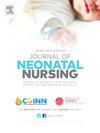The risk factors of post-traumatic stress disorder among parents of neonatal intensive care unit infants: A systematic review
Q2 Nursing
引用次数: 0
Abstract
Aim
The aim of this review is to identify the risk factors for post-traumatic stress disorder (PTSD) in parents of infants admitted to the neonatal intensive care unit (NICU).
Design
A This study is a systematic review of articles examining PTSD risk factors in parents of NICU-admitted infants. PTSD diagnoses were made using the DSM-IV, DSM-5, ICD-11, or DSM-IV-TR A1 criteria. This review does not address PTSD risk factors in the general population, other family members, or NICU patients. Regardless of the child's gestational age or gender, the focus is exclusively on NICU parents or primary caregivers. All other family members are excluded from the review.
Methods
A comprehensive literature review was conducted using multiple search algorithms to identify all relevant studies. The databases PTSDpubs, CINAHL, PsycINFO, and Web of Science were systematically searched. The study selection process was documented using the PRISMA flow diagram. Each study was independently assessed using the Critical Appraisal Skills Programme (CASP) framework. The selected articles were critically evaluated, and data were extracted and synthesised for analysis.
Results
A total of 286 previously published papers met the inclusion and exclusion criteria. Of these, eight studies were included in the systematic evaluation of PTSD risk factors among parents of NICU-admitted infants. Five key risk factors were identified: (1) Being female, (2) Having, or perceiving to have, a sick newborn, (3) Parents with previous obstetric problems, (4) Having mental health-related problems/diagnosis, and (5), Lack of psychological Support in the NICU.
Discussion
The synthesis of the selected studies reveals a multifaceted risk landscape. Being female was the most commonly reported risk factor, consistent with broader research indicating that women are generally at higher risk of developing PTSD. The presence of a sick newborn significantly heightened parental risk, likely due to the acute stress associated with managing a child's severe health challenges. A history of obstetric complications also emerged as a significant predictor, with past traumas compounding the emotional burden of the NICU experience. Pre-existing mental health conditions further increased susceptibility to PTSD, underscoring the importance of addressing underlying psychological vulnerabilities. Crucially, the lack of psychological support in NICU settings was identified as a systemic deficiency, exacerbating parental stress. This finding highlights gaps in family-centred and family-integrated care strategies, which fail to sufficiently address parents' psychological needs during critical periods of their child's hospitalisation.
Conclusion
This review underscores the complex interplay of factors contributing to PTSD in NICU parents and offers important clinical insights for developing targeted interventions. Healthcare systems must prioritise comprehensive psychosocial support for all NICU parents, not solely primary caregivers, to alleviate the immense stress that can lead to PTSD. The findings advocate for policy changes and the integration of robust psychological support structures within NICUs to bolster parental resilience during and after their infants’ hospitalisation.
新生儿重症监护室婴儿父母创伤后应激障碍的危险因素:一项系统综述
目的本综述的目的是确定新生儿重症监护病房(NICU)婴儿父母创伤后应激障碍(PTSD)的危险因素。本研究是对新生儿重症监护病房患儿父母PTSD危险因素的系统综述。PTSD诊断采用DSM-IV、DSM-5、ICD-11或DSM-IV- tr A1标准。本综述未涉及普通人群、其他家庭成员或新生儿重症监护病房患者的PTSD危险因素。无论孩子的胎龄或性别如何,重点都是新生儿重症监护室的父母或主要照顾者。所有其他家庭成员都被排除在审查之外。方法采用多种检索算法进行文献综述,筛选所有相关研究。系统检索ptsdpub、CINAHL、PsycINFO、Web of Science数据库。研究选择过程使用PRISMA流程图进行记录。每个研究都使用关键评估技能计划(CASP)框架进行独立评估。对选定的文章进行严格评估,并提取和综合数据进行分析。结果286篇既往发表论文符合纳入和排除标准。其中,8项研究被纳入对新生儿重症监护病房婴儿父母PTSD危险因素的系统评估。确定了五个关键风险因素:(1)女性;(2)有或认为有患病新生儿;(3)父母以前有产科问题;(4)有精神健康相关问题/诊断;(5)在新生儿重症监护室缺乏心理支持。所选研究的综合揭示了一个多方面的风险景观。女性是最常见的风险因素,这与更广泛的研究一致,表明女性患PTSD的风险通常更高。患病新生儿的存在显著增加了父母的风险,可能是由于与管理儿童严重健康挑战相关的急性压力。产科并发症史也是一个重要的预测因素,过去的创伤加重了新生儿重症监护病房经历的情感负担。先前存在的精神健康状况进一步增加了对创伤后应激障碍的易感性,强调了解决潜在心理脆弱性的重要性。至关重要的是,NICU环境中缺乏心理支持被认为是一种系统性缺陷,加剧了父母的压力。这一发现突出了以家庭为中心和家庭综合护理战略方面的差距,这些战略未能充分解决儿童住院关键时期父母的心理需求。结论本综述强调了NICU父母PTSD的复杂相互作用因素,为制定有针对性的干预措施提供了重要的临床见解。医疗保健系统必须优先为所有新生儿重症监护室的父母提供全面的社会心理支持,而不仅仅是主要照顾者,以减轻可能导致创伤后应激障碍的巨大压力。研究结果主张在新生儿重症监护病房内改变政策并整合强大的心理支持结构,以增强父母在婴儿住院期间和住院后的复原力。
本文章由计算机程序翻译,如有差异,请以英文原文为准。
求助全文
约1分钟内获得全文
求助全文
来源期刊

Journal of Neonatal Nursing
Nursing-Pediatrics
CiteScore
2.00
自引率
0.00%
发文量
143
期刊介绍:
Aims & Scope: This is the practical, bimonthly, research-based journal for all professionals concerned with the care of neonates and their families, both in hospital and the community. It aims to support the development of the essential practice, management, education and health promotion skills required by these professionals. The JNN will provide a forum for the exchange of ideas and information between the range of professionals working in this field; promote cooperation between these professionals; facilitate partnership care with families; provide information and informed opinion; promote innovation and change in the care of neonates and their families; and provide an education resource for this important rapidly developing field.
 求助内容:
求助内容: 应助结果提醒方式:
应助结果提醒方式:


